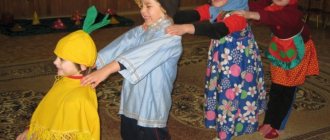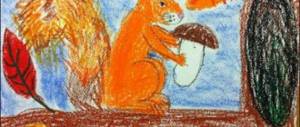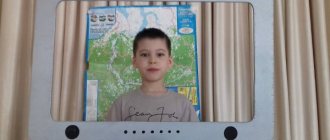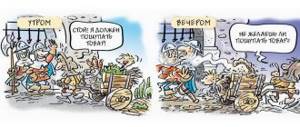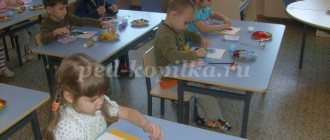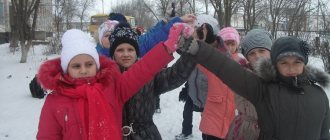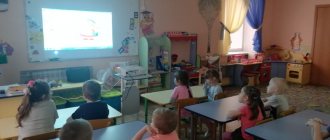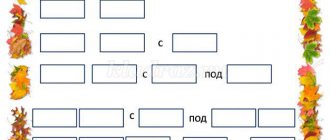A kindergarten teacher is a rather labor-intensive, but at the same time interesting profession. The person who chooses it must understand that he will not receive the fruits of his professional activity immediately, but only after many years, when mischievous girls and boys grow into adults who achieve some success in their lives.
A TEACHER IS AN ENTHUSIAST, A PERSON WHO WORKS NOT FOR A HIGH SALARY, BUT BECAUSE HE REALLY LOVES CHILDREN AND LOVES HIS PROFESSION.
A beginning teacher is not always a young person; there are often people of more mature age who have decided to retrain from their main specialty into the specialty of a teacher.
Surely, every newcomer will agree with the opinion of A.S. Makarenko, who said that no matter how well a student graduates from an educational institution, no matter what talent and abilities for the profession he possesses, if he does not learn from more experienced colleagues, he will never will become a real specialist.
A person who decides to devote his work to children will have to spend years of study, undergo an internship, defend his thesis, and, finally, get a job in a preschool institution.
What difficulties can lie in wait for a novice teacher?
The work of a teacher consists not only of direct contact with children and their parents, but also of close cooperation with other kindergarten workers. It often happens that “youth” cannot find a common language with “advanced leaders”. There are always more experienced teachers in the team; even a novice teacher should learn from them.
They should not be afraid or embarrassed to ask questions; they should understand and support the newcomer, since they themselves passed this test not so long ago. Advice from more experienced teachers is priceless for a beginner. Since they will help an inexperienced teacher avoid many professional mistakes. By listening to their advice, you will show that you respect their teaching experience and they have authority over you.
To work successfully with children, you need to gain their trust and authority.
Moreover, this conquest must be carried out from the first minutes of a novice teacher’s stay with children. If you do not have a trusting relationship with your children, then you will have problems with the issue of discipline, which is the main condition for successful and productive work with children.
Where to start? Of course, from the beginning, introduce yourself to the children, tell them something about yourself, get them interested in your personality. Be sure to show interest in each child so that the children understand that you care about them.
CHILDREN ARE EXCELLENT PSYCHOLOGISTS WHO DO NOT TOLERATE FALSETY, SO THE TEACHER SHOULD ALWAYS BE SINCERE WITH THEM.
When working with children, you should be guided by the following principles:
- To achieve self-respect, you must show it to others. Each child is already an individual who demands respect.
- You need to be honest with children and obligatory. The words of the teacher should never diverge from the actions. Children will not respect a person who does not believe in what he says.
- In preschool age, the main activity of children is play; use this to achieve success. Contact between the teacher and children should be based on play. A real teacher uses play in all areas of children's activities: while walking, during classes, when they wash themselves or go to bed, etc.
No matter what difficulties a novice teacher may have to face when working with children, you should not despair and hang your head, because for your efforts you will certainly be rewarded with the happy sparkle of your eyes and the radiant smiles of your students.
My experience as a teacher is very small - only two years. All my life I worked with people, communicated a lot, almost always found a common language with everyone. When I gave birth to my second child and came with him to the play support center for child development at our kindergarten, I realized that this is where I want to work. I plunged headlong into changing professions and received a second education – a pedagogical education. Everything seemed unusual, new, very interesting. I would never have thought that work could heal - you forget about your troubles as soon as you enter the group.
I remember my first shift in the garden very well. I came home very happy, tired, and somehow renewed. The first thing I did was... weigh myself: minus one kilogram. I laughed, comparing myself to a ballerina and a miner at the same time - they also spend a lot of energy at work.
Much has been said about the work of a teacher. The work is truly titanic if you want to raise the children entrusted to you. You need to have strong physical skills (to pick up and raise babies, and there are at least twenty-five of them in a group, everyone needs care and affection), artistic skills (after all, there are birthdays, leisure activities, fairy tales), poetic skills (to come up with a funny rhyme right away, to cheer up the little one), encyclopedic (“If it’s a stable, then there are only horses standing there, right? Where are the horses standing?”), musical (I still never get tired of thanking my mother for not letting me quit music school - how can I do that? useful right now!) data. You also need an eye in the back of your head, intuition of the highest level and, as is already clear, a sense of humor. And I also realized one thing - my new wonderful job is a powerful incentive for me not to become slack, to always be in shape, to constantly educate myself and not to lose heart.
Here are a few stories that happened to my students.
A story about how bad it is to miss classes
Andrey was gone for almost a month - he was sick. He really likes the girl Tasya in the group; when we go in pairs, he tries to stand with her and sits next to her at the table. In the morning he looks for her with his eyes, repeats her name - Tasya, Tasenka. Our Taisiya communicates smoothly with everyone, doesn’t single anyone out, is friendly, gentle, and misbehaves within acceptable limits. He looks at Andrey calmly, evenly - like he does at everyone else.
And here - on you... Tasya forgot Andrey. He doesn’t want to stand in one pair, he breaks his hand. In games it can even be off-putting. Andrei gets upset, his eyebrows frown in confusion - what is this? Smiles less...
Conclusion:
parents, toughen up your children, let them get sick less. You see, then they will be less upset - they are unforgotten))
PS Andrey now walks hand in hand with Maya, our Cinderella. He’s silent for now—he’s probably watching. Or does her name teach her?
The story of Cinderella
There is a girl in our group, Maya, who is quiet, calm, and efficient. He does everything skillfully and calmly. She is silent and focused in class. At the same time, the smile is kind and gentle, the eyes are smart, the gaze is inquisitive. The first assistant, if you need to collect toys or set the table, she is a neat girl - she is accustomed to this at home, even though she is the youngest. Cinderella, and only))
Conclusion:
children can do a lot, give them the opportunity to prove it to you - or just learn how to do it... And don’t rush - it’s better for one week every day for two hours of toys, the child will learn to clean himself and will definitely learn, than you will then spend your whole life watching him and his children you will clean everything (EVERYTHING!!!).
A story about the necessary self-education of a teacher
I myself have two daughters. I can’t say that I’m only thinking about little frills and bows, but I’m still not very familiar with many boyish things and concepts, especially when it comes to highly specialized areas.
Children often bring their toys to the group, we look at them, and learn to share them with others. Petenka brings a new car almost every day and declares from the door that this is his thing and he will not give it to anyone. At the same time, the eye works as a scanner, it immediately identifies the new cars brought by other children and tries to take possession of them - we must pay tribute, but it always changes, forgetting its credo about greed. The examination of new car treasures begins with comments from both owners, even if one of them does not speak very well, to put it mildly - in such cases, emotions, glances, gestures help - car enthusiasts almost always come to an agreement. The verdict is usually given to me by Petro, as the most vocal and even more “in the know”, reporting what kind of machines these are and how they differ. And do you know what the difficulty is? In car names!
Conclusion:
There is no doubt that TV is harmful to children. But, colleagues, watch cartoons - then at least you will be “in the know,” you will be able to authoritatively support the conversation of two- and three-year-olds and will not lose face by confusing car brands with their cartoon names.
The story of the “adult” Tasya
It was an ordinary day, as Winnie the Pooh would say. Joyful Tasya quickly flies into the group and begins to tinker with the big centipede Zippleka or the horse Lulu. Drawing, physical education, music... Classes go on as usual, between them Tasya asks for water more than once, drinks, and, accordingly, I invite her to the toilet more often than others. And then grandpa comes for Tasya, and in front of the street I again suggest that Tasya go to the toilet. I hear in response:
I’m already walking, I’m walking... You don’t need to lead me by the hand, I’ll get there myself... I’m already an adult... I’m almost three years old... And I keep writing and writing... How long can you?! I’ll sit on the potty myself, no need for help... And I’ll pee myself... Tasya is already an adult... That’s all already... I’ll get dressed myself... Okay, pour out my potty yourself, you can...
I can barely contain my laughter. All this is said with the completely serious air of an adult young lady who is pestered with some trifles. This grown-up young lady has funny ponytails and a child's hairpin on her hair, and the ponytails support Tasya with the appearance of small explosive fountains, and the hairpin wants to completely fall off her clever head out of indignation.
Conclusion
: Tasenka grew up - but I didn’t even notice. Let's be more attentive to our children.
PS I was especially pleased with the outburst of emotions - and what a speech! Coherent, to the point, verbose, explaining everything.
Title: Essay of a teacher “Notes of a beginning teacher”
Position: teacher Place of work: GBOU TsRR-kindergarten No. 1271 Location: Moscow
How to become a successful teacher? How many people ask this question... Is there a formula for success for a teacher?
It seems to me that I have found my formula for success. Children are delicate and sensitive little people. They immediately sense the falsehood. You can’t even imagine how difficult it was to join a group of teenagers after training to become a primary school teacher. Where my age was 4-5 years older than the children at the orphanage. I was helped by mentors who had worked for many years with children who found themselves in difficult life situations.
I give the first place in the teacher’s success formula to the mentoring of professional teachers, their method of work, proven and tested. Going only the beaten path is not for me. I wanted to stand out with something, to show that I didn’t study in vain, that I was taught to invent, to interest. With the help of educational methodological literature and the experience of others, I began to compile my own notes, conduct and learn lessons. I still carry out some events, since the students are constantly changing. After the first approbation, I put others aside and completely forget about them.
Second place is practice. Only through joint activities with students do you understand what children need, what is interesting to them and in what form.
You can't follow children's lead. They quickly lead you in their own direction, and it is impossible to achieve the result you need. You need to introduce rules for yourself, follow them and demand the same from your children. I think the most important thing is to finish what you start. I teach children to take on small things, but complete them, or divide the work among everyone, and do complex things piece by piece, and then put them together into a single whole. It is quite difficult for my students to immediately achieve success in any business. It is difficult to start speaking and speaking in public. Do a craft and see what you come up with. Strive to do even better next time.
Third place is to see the end result of any undertaking. This is relevant for children with disabilities. The main thing is that the result is not delayed. If this can be done in one lesson, then the students should receive the final result at the end of it. If this is a project, then at each stage you should see the result: what was done and why. Why are we doing this? How we will use it later.
Gathering in a group from all over the region, children get to know each other, get to know each other and their teachers. Sometimes this acquaintance is difficult and takes a long time. The guys often shed tears and miss their family and friends. The teacher’s task is to temporarily become a close person. Start performing actions together: playing together, making appliqués together (some using a template, some ready-made, some falling into the frame of what is shown, and great, well done). At the end of the quarter, you become family, and the students no longer want to part with you.
The fourth place is a joint activity that connects the hearts of children and the teacher.
I believe that by following these seemingly simple rules, the teacher will achieve success in his professional activities!
Almost all parents, when their child reaches a certain age, send him to kindergarten. Not everyone can afford to have a nanny. Adults take the choice of a preschool educational institution with great responsibility. First of all, attention is paid to the teacher who will be with the child in the absence of parents. This must be a person who really loves kids and finds a common language with them. And all the rights and responsibilities of a preschool employee are described by the kindergarten.
Who can become a teacher?
In order to start working in a preschool institution, you need to obtain a higher education diploma in the relevant specialty. A person who does not know the basics of pedagogy cannot be allowed to see children. The job description of a preschool teacher indicates that an employee with a medical certificate may be allowed to work with children. This means that before starting work you must undergo a full examination.
The teacher reports to the head and director. You can enter or leave a position only by appropriate order. Any controversial issues or unusual situations that arise during the work process are discussed with senior management. In his work, the teacher must be guided by the job description, as well as the internal regulations of the preschool educational institution.
Teacher's working day
Most kindergartens begin their work as early as 7 am. At this time, the teacher must already be in the institution to receive the first children. Each group usually has two teachers. The work takes place in shifts. This allows employees to be less tired and focus more on their children. The teacher’s work schedule is drawn up by the head of the preschool institution and approved by the director.
The job description of a junior teacher describes the number of hours that need to be worked during the week. A full schedule includes 36 working hours. An employee of a preschool institution is also entitled to leave, which can be 42 calendar days. In addition, you can arrange days off at your own expense.
Babysitting
The job description of a kindergarten teacher describes the main responsibilities of the employee. First of all, the specialist must closely monitor the children entrusted to him. Children should have good health and psychological state. If a child complains of pain or behaves unnaturally, the teacher must immediately take him to the infirmary and report the incident to senior management.
Together with medical staff, the teacher is obliged to carry out activities aimed at improving the health of children. This includes morning exercises, as well as daily walks outside.
The teacher is obliged to provide hygienic care for young children. An adult should ensure that the child washes his hands thoroughly before eating, as well as after visiting the street and the toilet. Children under three years of age must be pottyed regularly. If the child gets dirty, he needs to be changed and washed.
Children who come to kindergarten after illness are given special attention. Such children need to be freed from physical and emotional stress. If the child continues to feel unwell, parents should be informed. In some cases, it makes sense to extend sick leave.
✅ Functions of a kindergarten teacher
The functions of a kindergarten teacher include:
- upbringing, education and development of students in accordance with the Federal State Educational Standards (FSES);
- careful supervision of the children entrusted to him;
- monitoring children during the adaptation period;
- studying the individual characteristics and inclinations of children;
- creating conditions for individual development and moral formation of the individual;
- interaction with parents on the implementation of the general education program.
Educational work
The job description of an assistant teacher describes the main responsibilities of such an employee in the field of education. A kindergarten specialist must plan activities with children in accordance with approved state programs. Children 2-3 years old primarily learn self-care. By the end of the year they should be able to feed themselves, go to the toilet and dress themselves. The teacher carefully prepares for the classes. Using a variety of teaching aids and posters is a must.
The curriculum for children in the preparatory group is developed most carefully. The teacher's task is to teach children letters and the basics of writing. If a specialist works with children conscientiously, they will go to school with all the necessary basic skills. To study letters, Zaitsev’s method or the “Primer” method can be used. And so that the child learns to hold a pen correctly, he is offered to work with copybooks.
Advice for beginning teachers on working with children
1.
Avoid verbosity.
Children perceive about 80% of information not through the meaning of words, i.e.
not through what is said,
but through
how it is said
(intonation, facial expression, gestures, posture, etc.)
2.
Children under 2-3 years old
do not hear general recommendations and requests.
They understand those words that are addressed only to them.
Therefore, address each child separately, calling him by name and gently touching him with your hand (for example: “Vitya, get ready for a walk”)
3.
Never
compare one child to another!
It is forbidden to “certify”: “he is bad, and you are good.”
4.
It is recommended
to praise
children “
for any manifestation of spirituality
.”
Verbalized, i.e. are translated into verbal terms, not comments, but something that can cheer up
the child.
5.
Praise - in front of everyone, criticism - in private,
and only if it can help; With a reasonable dose of approval, criticism is usually not needed.
6.
Talk to your child as if the
qualities that you want to cultivate in him already exist:
“With your persistence, you will certainly achieve it, you will be able to do it,” “Your friends are attracted to you by your generosity.”
7.
Call children
by their first names only.
Find out in advance which version of his name the child likes best: Lyuda, Lyudmila or Mila.
8.
Politeness is cultivated only by politeness,
but not by remarks.
9.
The teacher provides a model for children through speech behavior. In a mixed-age group, older children teach younger ones, copying the teacher’s behavior model.
10.
When establishing rules of behavior in a group with your children,
try to “avoid” the words “no, no, no.”
Because at the subconscious level “No” is not perceived. Therefore, instead of
“You can’t shout, talk loudly” use “Speak quietly” or “It’s customary for us to speak quietly.”
11.
The rules of speech behavior are developed in situations and role-playing games.
When children have experienced the inconvenience of speaking and shouting together, they develop the rule: “ If you want to be heard, come closer and say it quietly
.”
12.
With the help of speech, a person can
defend his rights and protect himself.
Play out scenes more often when the child’s role requires him to speak in his own defense.
Children realize in such role-playing games that rudeness and defending their rights are completely different things.
13.
Enjoy a beautiful phrase
, proverb, saying more often
14.
Read your favorite poems to your children with enthusiasm,
retell your favorite children's books.
15.
If your child misbehaves, don't punish him.
Maria Montessori believed that bad behavior is a sign of illness,
and therefore offered the child, as a sick person, the most comfortable place, peace and quiet: “Take a break from the children, sit (lie down) away from them.”
16.
Use
humor and
jokes as
a universal cure for troubles and grievances.
Daytime naps in kindergarten
Experienced pediatricians believe that a child under 6 years old simply needs a nap during the day. Within a few hours the body regains its strength. The job description of a kindergarten teacher describes the responsibilities of a specialist in organizing children's routine. The teacher, together with his assistant, must organize the children’s day in such a way that the pupils have time not only to learn something new, but also to relax.
Daytime naps in kindergarten usually last from 13:00 to 15:00. Two hours is enough for children to restore energy. Some kids don't want to sleep in kindergarten. The job description of a preschool teacher describes what to do in such cases. You should explain to the child that he needs to be quiet so as not to wake up the other kids. The child should lie in his bed until the end of quiet time. Even a simple rest without sleep allows you to restore strength.
Educator is a profession of the soul
And indeed, real enthusiasts of their craft work in this area.
K.P. Sukhova , an excellent young specialist who has undergone retraining and advanced professional qualifications, has been working in the Ogonyok kindergarten for a year now Since 2013, Ksenia Petrovna has been receiving higher pedagogical education with a degree in Psychology.
Kind, artistic and talented, she knows how to captivate children and adults, and takes care of the physical and spiritual health of her students. During classes, walks, and during excursions, he introduces children to the memorable places of his native village, cultivates patriotic feelings for his small Motherland, and learns poetry with them.
Currently, Ksenia Petrovna’s preparatory group “Thumbelina” consists of 24 inquisitive, active and cheerful children. Teaching mathematics, speech development, and drawing are not all that need to be taught to future first-graders. Many people are surprised: “How can you organize so many children when you can’t cope with one or two at home?” A competent teacher does not have problems with discipline; children understand everything at a glance.
And she develops a trusting relationship with her students’ parents; they often seek help and advice. In the team, Ksenia Petrovna is valued as a demanding and fair specialist. She actively participates in the life of the kindergarten, speaking at seminars and pedagogical councils.
Like any worker in the teaching field, Ksenia Petrovna also had difficulties, but she overcame them in order to hear the happy and clear voices of the kids around her, their endless “Why?”
“My students are different, and their moods are different: some are capricious, some are playing around, some are having too much fun, and some are bored. And every little person needs his own approach, his own treasured “key”. I can joke with someone, I can cheer someone up, and for someone, just a kind look is enough. I’ll have a heart-to-heart talk with one, and I’ll just hug and caress some “capricious” person - he’ll calm down. No matter what I’m doing, if a child comes to me with even the smallest problem, I put everything aside, try to listen to him, find kind words, and cheer him up, says Ksenia Petrovna.
— My main method in teaching, developing and raising children is play. After all, children live in play, seeing from their own experience how unpleasant it is to be offended, and how joyful it is to receive help when you need it. My task, having noticed the child’s abilities, is not only to support the weak shoots of future endeavors, but also to convince parents of the need to develop them in the child. I would like to thank my mentors V. A. Valyunina, N. P. Kvitko, M. G. Myagkova and N. E. Glushkova for their support and transfer of invaluable experience, which is so necessary for young specialists.
Diet in kindergarten
Four meals a day are mandatory for every preschool institution. Kids have breakfast as soon as they come to kindergarten, have lunch before bed, have an afternoon snack after bedtime, and have dinner before going home. The job description of a junior preschool teacher describes how a teacher should behave with children during meals. Babies who do not yet know how to hold a spoon on their own should be given assistance. It is also necessary to ensure that children eat only their portion. If possible, the baby can be offered a supplement. It is important to remember that each child has different nutritional needs.
The job description of an assistant teacher describes what equipment should be used while eating food. Children under 4 years old are not allowed to use forks. This cutlery is hazardous. The teacher's assistant arranges plates and cutlery in such a way that the kids do not interfere with each other while eating food.
Organizing outdoor walks
Fresh air is very important for the normal development of a child. must be included in the job description of the junior teacher describes how an employee should behave before taking the kids out into the fresh air. Pupils who cannot yet take care of themselves independently need assistance. We need to help each child get dressed and put on shoes. It is necessary to ensure that the ward is comfortable and cozy.
The job description of a kindergarten teacher indicates that the specialist does not have the right to take children outside the preschool institution. For walks there are special areas with sandboxes and swings. Each group is assigned its own place. In exceptional cases, the teacher may take the children on an excursion to the city or museum. In this case, it is necessary to obtain written permission from senior management. A preschool age group can go out into the city accompanied by two adults. The teacher is obliged to strictly observe traffic rules and transfer children across the road only at the crossing.
Robert Owen
Man is a product of his environment.
In 1802, Robert opened the first ever kindergarten in Scotland. The kindergarten was attended by the children of factory workers owned by Owen. There was a separate group for each age: children under two years old went to a nursery, under six years old went to the main group, and for older children there was a separate school. Robert called his “brainchild” “The Institute for Character Education.”
Owen was from a poor family, so he dreamed of a society without poverty and injustice. To do this, in his opinion, it is necessary to create an environment with the correct education of personal qualities from childhood.
Robert believed that:
- It is necessary to engage in labor education of children;
- A person’s character is shaped by his social environment and upbringing;
- Childhood years decide a lot in the formation of character, so you need to start raising children as early as possible.
In the kindergarten, the children studied music and dance, and played a lot in the fresh air. Robert paid great attention to discipline, communication in a team and taught children to be orderly. He worked on the personal qualities of the children - he instilled in them honesty, respect for their comrades, friendliness and kindness. All learning was visual: drawings on the school walls depicted plants and animals, children studied using visual aids.
Adaptation of children to preschool
The first months in kindergarten are the most difficult for a child. The teacher’s task is to create psychological comfort for the child, who just yesterday was not separated from his mother even for an hour. The job description of a GPD teacher describes how a specialist should behave with children in the nursery group. It is necessary to make it clear to the child that he will not be offended in kindergarten, and that the teacher is a person who can replace his parents for some time.
Parents also play an important role in a child’s adaptation to preschool. The mother must explain to her son or daughter that she will soon have to go to work. The child will spend some time in kindergarten. It is important to introduce the child to the teachers and group in advance. At first, the baby can be left for several hours.
The job description of a teacher according to the Federal State Educational Standard does not describe the emotional component of the work of a preschool specialist. However, everyone should understand that small children need warmth and affection. This is especially important for those kids who are just starting to attend kindergarten. The teacher can hug and calm the baby who is crying for his mother. The little man should feel attention and support.
Friedrich Froebel
Children, like plants, need skillful care.
Friedrich is considered the founder of kindergartens, although his first garden appeared 37 years later than Robert Owen's garden. Froebel's kindergartens had clear tasks - to educate and educate children to reveal their natural characteristics:
- activity skills,
- abilities of cognition,
- artistic skills,
- religious abilities.
Friedrich was orphaned early, so he said about his childhood: “Nature was my school, trees and flowers were teachers.” He built education in kindergartens on these principles. It was Friedrich who came up with the idea of calling a preschool a “garden” because he believed that children should be taken care of as carefully as a gardener takes care of plants.
Froebel created teaching aids for kindergartens - “gifts”. Using them, teachers taught children colors, shapes, direction of movement, and sizes. For example:
- The first gift is wool balls of different colors attached to threads. The teacher shook the ball and named the directions of movement - right, left, back, front.
- The second gift is the sphere, cube and cylinder. With their help, children studied basic geometric bodies and their properties.
Frederick's system, together with the “gifts,” was used by educators of subsequent generations. Some still use the “gifts,” but in a modified form.
What should a teacher know?
You must come to the position of kindergarten specialist only by vocation. A person who does not find a common language with children will not make a good teacher. But love for children alone is not enough to become a qualified specialist. The job description of a senior preschool teacher describes what a person must know to start working with preschool children. First of all, these are also the basic methods of educational work. The specialist must also know the basic state laws and regulations related to the education of preschool children.
Despite the fact that there is usually a nurse in the kindergarten, the kindergarten teacher must know how to properly provide first aid before the doctor arrives. The specialist annually undergoes advanced training courses in life and labor protection. Also, the teacher must know fire safety standards and
The job description of a boarding school teacher describes the basic regulations that a specialist working with disabled children should know. Such kids are given special attention. Typically, groups in preschool institutions of this type consist of several people. This allows the teacher to pay more attention to each child with disabilities.
Advice for a novice teacher
Eva Norina
Advice for a novice teacher
kindergarten teacher The person who chooses it must understand that he will not receive the fruits of his professional activity immediately, but only after many years, when mischievous girls and boys grow into adults who achieve some success in their lives.
A TEACHER IS AN ENTHUSIAST , A PERSON WHO WORKS NOT FOR A HIGH SALARY, BUT BECAUSE HE REALLY LOVES CHILDREN AND LOVES HIS PROFESSION.
A beginning educator is not always a young person; often there are people of more mature age who have decided to retrain from their main specialty into the specialty of an educator .
Surely, every beginner will agree with the opinion of A. S. Makarenko, who said that no matter how well a student graduates from an educational institution, no matter what talent and abilities for the profession he possesses, if he does not learn from more experienced colleagues, he will never will become a real specialist.
A person who decides to devote his work to children will have to spend years of study, undergo an internship, defend his thesis, and, finally, get a job in a preschool institution.
What difficulties can lie in wait for a novice teacher ?
The work of a teacher consists not only of direct contact with children and their parents, but also of close cooperation with other kindergarten employees. It often turns out that “youth”
cannot find a common language with
the “advanced workers”
.
more experienced teachers in the team a novice teacher should learn from them .
They should not be afraid or embarrassed to ask questions; they should understand and support the newcomer, since they themselves passed this test not so long ago. Advice from more experienced teachers is priceless for a beginner. Since they will help an inexperienced teacher avoid many professional mistakes. By listening to their advice , you will show that you respect their teaching experience, and they have authority with you.
To work successfully with children, you need to gain their trust and authority. Moreover, this conquest must be carried out from the first minutes of a novice teacher’s stay with children . If you do not have a trusting relationship with your children, then you will have problems with the issue of discipline, which is the main condition for successful and productive work with children.
Where to start? Of course, from the beginning, introduce yourself to the children, tell them something about yourself, get them interested in your personality. Be sure to show interest in each child so that the children understand that you care about them.
CHILDREN ARE EXCELLENT PSYCHOLOGISTS WHO DO NOT TOLERATE FALSETY, SO THE TEACHER SHOULD ALWAYS BE SINCERE WITH THEM.
When working with children, you should be guided by the following principles:
To achieve self-respect, you must show it to others. Each child is already an individual who demands respect.
You need to be honest with children and obligatory. The words of the teacher should never diverge from the actions. Children will not respect a person who does not believe in what he says.
In preschool age, the main activity of children is play; use this to achieve success. Contact between the teacher and children should be based on play. A real teacher uses play in all areas of children's activities: while walking, during classes, when they wash themselves or go to bed, etc.
No matter what difficulties a novice teacher may encounter when working with children, one should not despair and “hang your head”
, because for your efforts you will definitely be rewarded with the happy sparkle of your eyes and the radiant smiles of your
students .
Rights of a kindergarten teacher
A preschool specialist has the rights provided for by the labor code. First of all, this is an opportunity to get vacation, including 42 calendar days. The teacher also has the right to a day off during the week. Within 7 days, the specialist must work 36 hours. It is possible to take a vacation at your own expense (no more than 14 days per year).
A preschool specialist has the right to introduce his own educational methods if they give good results. However, before starting practice, it is necessary to discuss the nuances with senior management.
Let's sum it up
The position of a teacher in a preschool institution is interesting and responsible at the same time. A specialist has many responsibilities. But if a person really comes to work by calling, no problems will arise.
You have been appointed senior teacher. This is recognition of your education, your teaching talent and authority and at the same time - a great responsibility. How to justify trust, how to show your best side? This question faces all senior educators, and everyone solves it for themselves as best they can. I want to show off my erudition, demonstrate my knowledge in the field of theory and methods, fill out a huge amount of paperwork: plans, diagnostic charts, reports, analyses. It is necessary, it is necessary, it is necessary... But the people working with you are not soulless robots. They are living women, each with their own character, with their own problems, advantages and disadvantages. They are not only teachers, they are women, mothers, sisters, grandmothers. And you, as a senior teacher, must help them be interested, but not focused only on work - cheerful and talented, artistic, going to kindergarten as if it were a holiday.
First, introduce your colleagues to the “Rules of Pedagogical Hygiene.” Give them bright reminders, offer to hang them above your desk and read them every morning and every evening, constantly focusing your eyes on these simple, but at the same time, wise advice.
